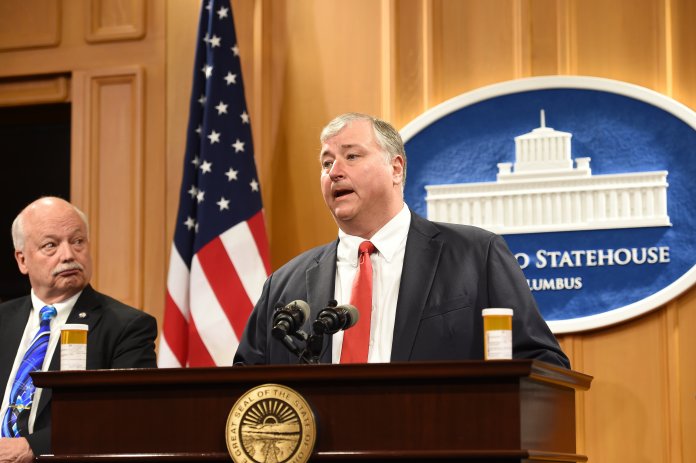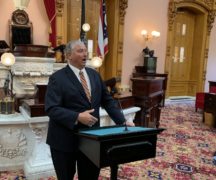By JAN LARSON McLAUGHLIN
BG Independent News
The state legislators representing Wood County both co-sponsored and voted for House Bill 6 – the nuclear power bailout bill at the center of the biggest bribery scandal in Ohio governmental history.
It was revealed earlier this week that $61 million in bribes linked to First Energy, were used to get Householder in the speaker seat, to push through the nuclear bailout bill, and to cheat voters out of a referendum on the bill, according to the FBI investigation.
State Sen. Theresa Gavarone, R-Bowling Green, whose district covers one of the nuclear power plants involved – Davis Besse – said she voted for H.B. 6 because it benefited her constituents.
“I was working through H.B. 6 to help the people in my district,” she said.
While Gavarone supported the bill, she is no fan of Householder.
“I didn’t even vote for Householder for speaker when I was in the House,” she said, instead supporting Rep. Ryan Smith.
And Gavarone has joined some state Republican officials in asking that Householder step down.
“We are still early in the process, but the allegations against Larry Householder are deeply concerning, she tweeted on Wednesday. “Government cannot operate effectively without the trust of the public and he has violated that trust. I urge him to resign immediately.”
As for State Rep. Haraz Ghanbari, R-Perrysburg, he is not among the leaders asking Householder to step down. Multiple phone messages were left at Ghanbari’s office and on his cell phone on Wednesday and Thursday, but he did not respond.
According to the investigation, Gavarone received money from First Energy Solutions – $1,500 in 2018, $1,000 in 2019, and $3,500 in 2020.
That money was not in exchange for her vote, Gavarone said.
“Absolutely not,” she said. “I vote on legislation based on what’s best for my district.”
H.B. 6 did help a major employer in her Senate district – Davis Besse.
“That’s one of the largest employers in Ottawa County,” Gavarone said. “It’s really important to my district. I’m looking out for what’s best for my district, the people I represent.”
Ohio Capital Journal reported earlier this week that Ghanbari received a $1,000 donation from the Friends of Larry Householder Committee the day after voting in favor of H.B. 6. However, further investigation showed that not to be the case.
Unlike Gavarone, much of Ghanbari’s district of Wood County was opposed to the nuclear bailout bill. Bowling Green officials tried to convince both of the detriments to the bill since it took money away from renewable energy – which Bowling Green has invested a great deal in.
H.B. 6 provides subsidies for nuclear and coal power – while gutting subsidies for green power like hydroelectric, solar and wind.
Supporters of renewable energy see H.B. 6 as a step backwards for Ohio. And Bowling Green leaders saw it as the state changing the rules after encouraging communities to invest in green energy.
Gavarone said she made some tweaks in the Senate version of the bill after meeting with Bowling Green officials.
“I wanted to make sure we were able to address their concerns,” she said.
“I’ve established a reputation as someone who listens to all sides of the issue,” Gavarone said.
Last year, as the bill was nearing a vote, Bowling Green officials traveled to Columbus in hopes of convincing state officials that Ohio could salvage the Davis Besse and Perry nuclear power plants without sacrificing green energy efforts.
Bowling Green officials warned that the bailout bill would cost the city $400,000.
Near the same time, Ghanbari said that while he was concerned about his Wood County district, he also had to look out for the rest of the state, the employment that comes from nuclear power and the manufacturers who depend on it.
The nuclear bailout will “lower the bills for customers in the state of Ohio and in Wood County,” he said.
Bowling Green officials disputed that statement.
H.B. 6 was also opposed by a major employer in Ghanbari’s district – First Solar. The solar equipment manufacturer was born in Perrysburg more than two decades ago, and employs more than 1,250 people.
————
For those who need a recap of the Householder scandal, here is a brief rundown from Ohio Capital Journal.
Ohio House Speaker Larry Householder, four political operatives and a dark-money group were charged Tuesday in a criminal complaint that an Ohio energy company paid them $61 million to get a $1.3 billion nuclear bailout from taxpayers.
Charged along with Householder were Matt Borges, a lobbyist who was formerly chairman of the Ohio Republican Party, Neil Clark, a lobbyist who owns Grant Street Consulting, Juan Cespedes, also a lobbyist, and Householder’s aide, Jeffrey Longstreth.
All are charged with racketeering, which carries a prison sentence of up to 20 years.
The alleged conspiracy, which revolved around the bailout of two failing nuclear plants in Northern Ohio, is “likely the largest bribery and money-laundering scheme ever in the state of Ohio,” David M. DeVillers, U.S. Attorney for the Southern District of Ohio, said at a Tuesday afternoon press conference.
Shortly after the press conference, Ohio Gov. Mike DeWine called on Householder, his fellow Republican, to step down.
The $61 million was used for three general purposes, the complaint said. First it was used to build “Team Householder” through campaign contributions and other measures that helped Householder win the speakership in 2019.
In exchange for payments, Householder’s enterprise helped pass H.B. 6.
The money was also used for the personal benefit of Householder and the other conspirators, DeVillers said. Householder got about $500,000, he said. Of that, he used $20,000 to pay off credit card debt, $100,000 for repairs to a house he owns in Florida and another amount was used to settle a civil lawsuit against Householder.
And the money was used to fend off a petition effort to repeal HB 6, going so far as to buy plane tickets for and pay $2,500 each to people circulating it to get out of town, DeVillers said.





